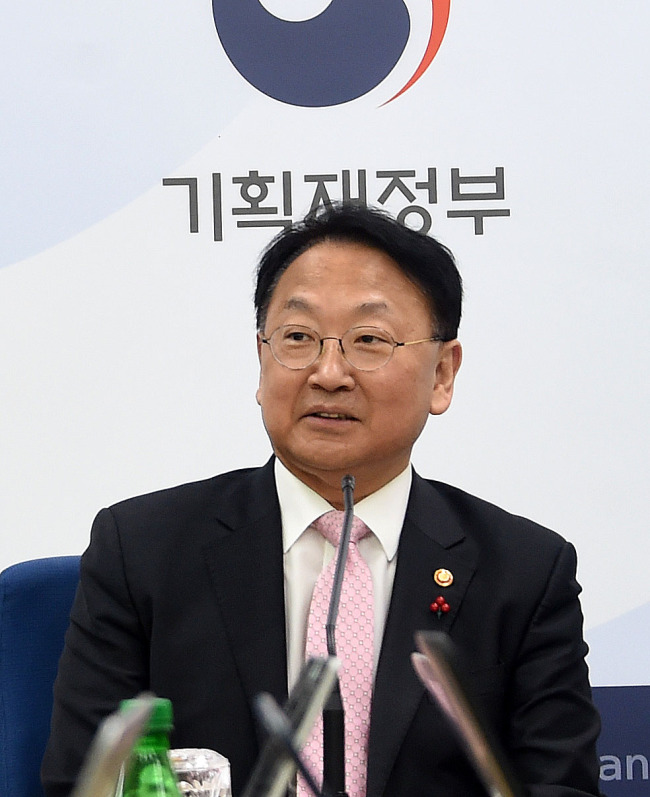Seoul regrets Tokyo’s suspension of talks on currency swap deal
By Korea HeraldPublished : Jan. 6, 2017 - 13:20
South Korea’s Finance Ministry said Friday it regrets Japan’s decision to suspend bilateral talks on a currency swap deal, amid rising diplomatic tensions.
“We regret that the talks on the Korea-Japan currency swap deal was suspended due to political and diplomatic issues,” the ministry said in a statement.
“It is desirable that the two countries continue bilateral economic and financial cooperation regardless of political and diplomatic relations.”
Tokyo said earlier in the day that it has withdrawn from negotiations with Korea to reopen the currency swap deal, after the Korean government let a statue symbolizing the victims of Japan’s wartime sexual slavery be built in front of its consulate building in the southern port city of Busan.
Finance ministers of the two countries had agreed in August last year to resume the currency swap deal talks, as the $10 billion deal expired in February 2015.
Meanwhile, Finance Minister Yoo Il-ho said the government is reviewing whether to set up a response team to deal with China’s indirect retaliation against a plan to deploy a US anti-missile system here.
“We regret that the talks on the Korea-Japan currency swap deal was suspended due to political and diplomatic issues,” the ministry said in a statement.
“It is desirable that the two countries continue bilateral economic and financial cooperation regardless of political and diplomatic relations.”
Tokyo said earlier in the day that it has withdrawn from negotiations with Korea to reopen the currency swap deal, after the Korean government let a statue symbolizing the victims of Japan’s wartime sexual slavery be built in front of its consulate building in the southern port city of Busan.
Finance ministers of the two countries had agreed in August last year to resume the currency swap deal talks, as the $10 billion deal expired in February 2015.
Meanwhile, Finance Minister Yoo Il-ho said the government is reviewing whether to set up a response team to deal with China’s indirect retaliation against a plan to deploy a US anti-missile system here.

Beijing is concerned that the Terminal High Altitude Area Defense system poses a threat to its territory, while Seoul and Washington said the missile defense system -- to be deployed in May or June -- aims to thwart threats from North Korea.
Since Seoul’s decision on the THAAD last July, China has reportedly banned some Korean entertainment content from airing on TV, restricted Chinese tourists from visiting South Korea and rejected South Korean airliners’ requests to add chartered flights between China and South Korea.
“It is possible that China might be taking nontariff measures but it’s hard to deal with it because Beijing is officially denying it,” Yoo told reporters in Sejong.
“If we say we’re setting up a response team, the issue might become thornier. The official response has already been made by the Foreign Ministry. But if necessary, I will consider setting up an economic response team in cooperation with the Trade Ministry.”
Yoo also flatly denied the possibility of the US naming South Korea as a foreign currency manipulator, in response to a report by a think tank that said the new US administration might put China and South Korea on its manipulator list in the first half of the year.
The US Treasury Department names a country a currency manipulator if three criteria are met: the country has more than $2 billion of trade surplus with the US; the current account surplus exceeds 3 percent of its gross domestic product; and the country is suspected of having intervened to artificially weaken its currency.
“Out of the three, Korea meets only (the first) two. I can say without shame that we’re not a currency manipulator. But no one knows what will happen in international relations, so I will explain this well to the US,” Yoo said.
The minister is scheduled to visit New York on Monday to meet global investors and US government officials to promote the Korean economy.
Yoo said he will emphasize the need for closer international cooperation to overcome protectionism in trade, apparently mindful of President-elect Donald Trump’s campaign pledges to “put America first” in global trade.
He also said it would be too early to spend a supplementary budget in February, as ruling party lawmakers have demanded it to support the weak economy, citing uncertainties in the first quarter.
“I’m not going to avoid it, but we have to see the economic indicators of the first quarter first,” he said.
By Kim Yoon-mi & news reports (yoonmi@heraldcorp.com)
-
Articles by Korea Herald



















![[Today’s K-pop] Treasure to publish magazine for debut anniversary](http://res.heraldm.com/phpwas/restmb_idxmake.php?idx=642&simg=/content/image/2024/07/26/20240726050551_0.jpg&u=)